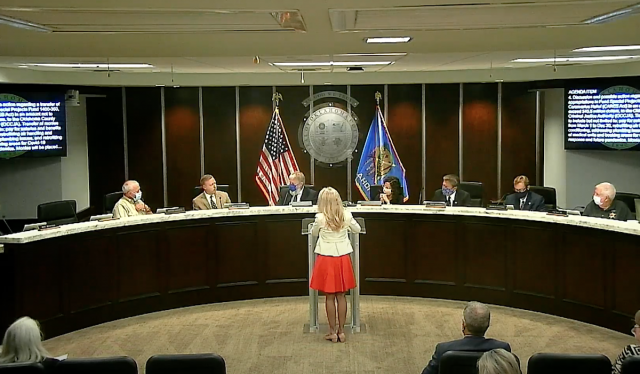

The Oklahoma County Budget Board voted to use $44 million in CARES Act funds for the Oklahoma County Jail in a brisk 32-minute meeting today, but the move didn’t come without controversy.
Oklahoma County received $47 million in CARES Acts funds. District 3 Commissioner Kevin Calvey made a motion to transfer the majority of that money to the Oklahoma County Criminal Justice Authority, which oversees day-to-day operations at the facility and is commonly called the “jail trust.”
Calvey, who also sits on the board of the jail trust, told the board the funds are needed for extensive novel coronavirus mitigation efforts at jail, including additional so-called “hero pay” for some of those working during the pandemic.
Oklahoma County Criminal Justice Authority trustee Sue Ann Arnall told the board the jail is near a breaking point as it copes with the virus. She said the jail’s population sits at about 2,000 people as of Thursday’s meeting.
“We’re in a crisis situation right now at the jail,” Arnall said. “We have a front door wide open and the back door cracked. Barely open. We’re stacking them up. It’s extremely dangerous.”
Blumert objects to use of funds
The first of four motions considered by the board called for the transfer of $36.1 million of county CARES Act funds to the justice authority. (The county’s Fiscal Year 2020-2021 budget allocated just over $30 million to the sheriff’s office for detention expenses.)
District 1 Commissioner Carrie Blumert strongly objected to the transfer.
“I don’t think this is the correct use of CARE funds,” Blumert said. “On behalf of District 1, my office gets calls every day from businesses and people and nonprofits who are struggling, and they need help. For us to give all of this money to the jail makes zero sense to me. I can understand writing the jail a pretty significant sum, because there are a lot of things the jail is dealing with right now related to COVID, but making the motion to transfer remaining funds, I don’t even have words for it. I’m frankly shocked by this item.”
Calvey said taking care of small businesses and nonprofits wasn’t the function of county government and that those in need will be able to take advantage of state funding.
“It is irresponsible governing to take on new tasks that county government has never done before, or at least hasn’t done in a long time, before we take care of our own house,” Calvey said. “What is the best budgeting thing is to take care of our core functions first, and that is the jail. It’s the most expensive one by far. There are certain functions of county government that only the county can do, and the jail is one of those.”
Freeman questions legality
Oklahoma County Treasurer Forrest Freeman questioned the legality of transferring the funds to the jail.
“I really would like to hear some legal recommendations before we take such a motion,” he said. “I can tell you right now I am scared to death of this.”
Freeman also objected to the use of the term “hero pay” for some jail staff, saying it should instead by called “hazard pay” and that those expenses aren’t approved uses of CARES Act funds anyway.
“If it’s hazard pay, you had better start calling it that,” he said.
Freeman argued the entire process was moving too fast and that the county risks legal exposure.
“I’m scared to death of the feds,” Freeman said. “If their auditor comes down and says that $30 million — or whatever you moved over to the jail — it wasn’t justified and it wasn’t even legal. Guess what? We’re on the hook.”
Calvey said Congress has said overtime and hazard pay are allowed under the CARES Act.
Calvey voted in favor of the funds transfer, as did District 2 Commissioner Brian Maughan, County Clerk David Hooten, County Court Clerk Rick Warren and County Comptroller Mike Morrison, who sat in for County Assessor Larry Stein.
Blumert, Freeman and Oklahoma County Sheriff P.D. Taylor voted against the item.
Blumert walks out, Taylor makes ominous reference

After the 5-3 vote on transferring the $36.1 million, the board also approved motions to transfer $3 million in CARES funds for hazardous duty pay and $3 million for capital expenditures in the jail designed to mitigate the spread of novel coronavirus. Two motions also provided $1 million in additional pay for juvenile justice staff and $1 million to the Oklahoma County Sheriff’s Department.
At that point, Blumert left the meeting.
“This is just crazy,” she said. “We’re throwing money around: $40 million dollars, and we’re just pressing buttons. We haven’t sat through or thought through any of this. I don’t even know how to vote right now. This is so disrespectful to our citizens. I’m so ashamed this is happening right now.”
In the board’s closing comments, Taylor emphasized that he voted against the $36.1 million motion because he questioned its legality.
“Just for the record, I voted ‘No’ on Item 4,” he said. “I’m assuming people who voted ‘No’ won’t have to go to the Federal Bureau of Prisons.”
Maughan said there are no legal concerns about the movement of CARES funds to the jail. He said if efforts aren’t undertaken to reduce virus cases at the jail, the county could later be sued by an inmate or staff member who becomes sick.
“I want to say, too, about any insinuation that this hasn’t been well thought out, I’ve been thinking about this since we got the money,” he said. “The fact that we have so many (cases) in a concentrated area obviously suggests that we’re going to likely see a spread of it. That has way more ramifications of spreading among inmates.”




















